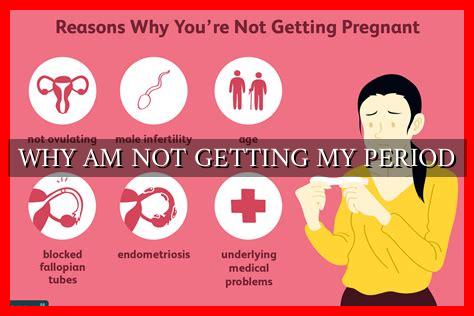-
Table of Contents
Why Am I Not Getting My Period?
Menstruation is a natural process that occurs in the female body, signaling reproductive health and fertility. However, there are times when women may experience irregularities in their menstrual cycle, including missing periods altogether. If you find yourself asking, “Why am I not getting my period?” there could be several underlying reasons for this phenomenon.
1. Stress and Lifestyle Factors
One of the most common reasons for missing periods is stress. High levels of stress can disrupt the delicate balance of hormones in the body, leading to irregular menstrual cycles. Additionally, factors such as excessive exercise, poor nutrition, and significant weight loss can also impact your menstrual cycle.
- Try to incorporate stress-reducing activities into your daily routine, such as yoga, meditation, or deep breathing exercises.
- Ensure you are eating a balanced diet rich in nutrients to support your overall health and hormonal balance.
- Avoid over-exercising and give your body time to rest and recover.
2. Hormonal Imbalance
Hormonal imbalances can also cause irregular periods or missed periods. Conditions such as polycystic ovary syndrome (PCOS), thyroid disorders, and pituitary gland issues can disrupt the normal functioning of your reproductive system.
- Consult with a healthcare provider to determine if you have any underlying hormonal imbalances that may be affecting your menstrual cycle.
- Follow their recommendations for treatment, which may include medication, lifestyle changes, or hormonal therapy.
3. Medical Conditions
Certain medical conditions can also impact your menstrual cycle. Endometriosis, uterine fibroids, and pelvic inflammatory disease are examples of conditions that can cause irregular periods or amenorrhea (absence of menstruation).
- Seek medical advice if you suspect you may have a medical condition that is affecting your menstrual cycle.
- Undergo necessary tests and screenings to diagnose any underlying health issues.
4. Medications and Birth Control
Sometimes, medications or birth control methods can affect your menstrual cycle. Certain medications, such as antidepressants, antipsychotics, and chemotherapy drugs, can cause changes in your period. Similarly, hormonal birth control methods like the pill, patch, or IUD can alter your menstrual cycle.
- Discuss any changes in your menstrual cycle with your healthcare provider if you suspect it may be related to medication or birth control.
- Consider alternative birth control methods or adjustments to your current medication regimen if necessary.
5. Age and Menopause
As women age, their menstrual cycles may become irregular before eventually stopping altogether. Perimenopause is the transitional phase before menopause when hormone levels fluctuate, leading to changes in the menstrual cycle. Menopause is the natural cessation of menstruation, typically occurring in women around the age of 50.
- Consult with your healthcare provider if you are experiencing changes in your menstrual cycle due to age-related factors.
- Discuss options for managing symptoms of perimenopause and menopause, such as hormone replacement therapy.
Summary
Missing periods can be concerning, but it’s essential to understand that there are various reasons why you may not be getting your period. Factors such as stress, hormonal imbalances, medical conditions, medications, and age can all play a role in disrupting your menstrual cycle. If you are experiencing irregular periods or amenorrhea, it’s crucial to seek medical advice to determine the underlying cause and receive appropriate treatment.
Remember, your menstrual cycle is a vital indicator of your overall health, so it’s essential to listen to your body and address any concerns promptly. By taking proactive steps to understand and manage the factors affecting your menstrual cycle, you can promote your reproductive health and well-being.


